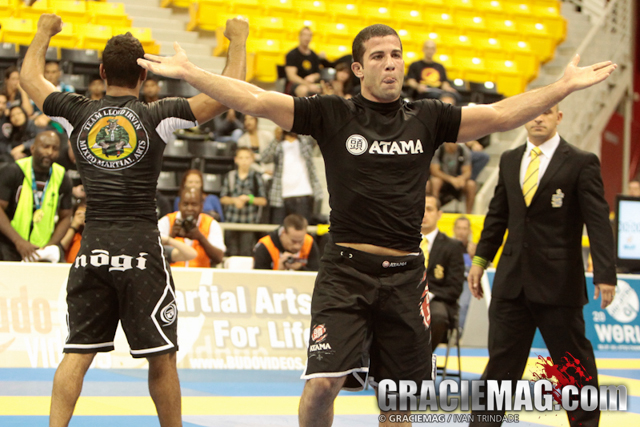
After years of refereeing, Augusto Tanquinho, the medal-collecting machine from Soul Fighters, became a world champion in classical (2013) and no-gi (2012, 2015) and made it to the UFC as a bantamweight.
1) At the start of my career as a professional fighter, I quickly learned that when refereeing in big IBJJF events, I was able to see technical details that were hard to see on video — details and movement executed, no less, by the biggest names in BJJ. Probable only the opponent and the center ref have access to a wealth of details that happen in a fight, due to how quickly they occur. Cases of a crucial grip or some hidden control.
2) I learned to master the rules of the sport, since I decided to study this seriously to be an above-average ref. This gave me advantages during fights, enabling me to use the rules in my favor when it was time to take off the ref suit and don the gi again.
3) I acted as ref so many times where I saw athletes let wins slip through their hands, that I learned that BJJ is much more complex than I could have thought. Starting from this lesson that I learned, I felt the need to become well rounded as an athlete, to be able to control each and every action a fight could lead me to — and not lose due to details at the end.
4) I learned not to use the ref as an excuse for a loss. As an athlete, we know very well that nobody likes losing, and sometimes we look for excuses for defeat, like pain, injury or refereeing errors. Yes, refs make mistakes. They are human and sometimes work right up to their limit, but they often get it right. It’s up to the athlete to be humble enough, critical of themselves, and to know that they, as an athlete, made a mistake too. And then go back to the gym and correct their flaws to get where they want to go. And — always a good idea — it’s worth studying the rules deeply, because it’s often easier to complain than to understand the rules. Thus, by seeing their own errors instead of blaming the ref, the martial artist will be capable of leaving their comfort zone and reaching a higher level.
5) And, first and foremost, I realized how hard it is to be a BJJ ref. So I learned to respect them, especially when they are working — they have fractions of seconds to make calls, work under great pressure to be right, and don’t make as much money as the professional athletes. The vast majority of refs love BJJ, and that is their way to give back to the community — by doing serious work, for love.
- Interviewed by Marcelo Dunlop.
